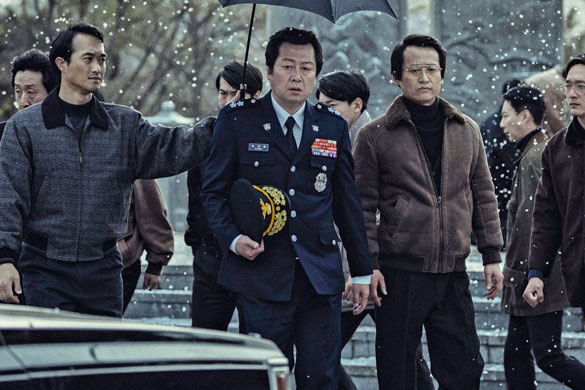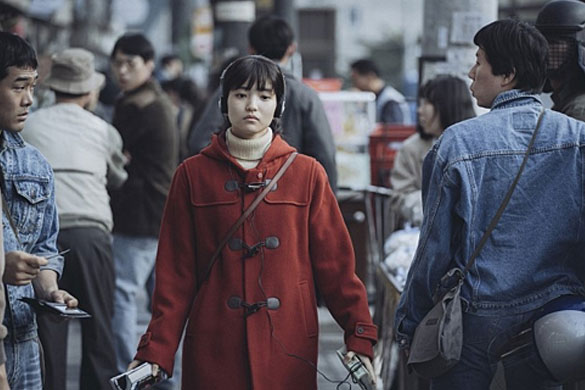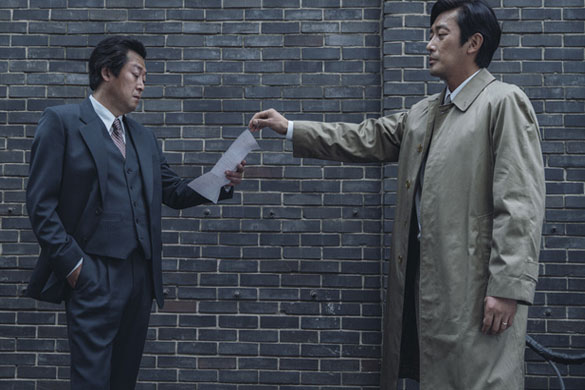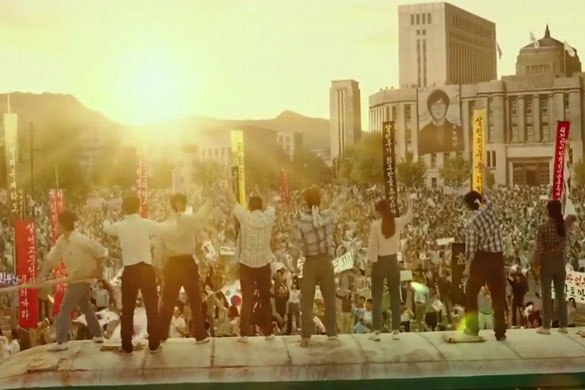
 |
||||
In the midst of the South Korean government’s somewhat paranoid, wholly blinkered search (or even witch-hunt) for Communist spies, infiltrators and factions in the 80s, Park Jong-chul, a student activist, is killed during a brutal police interrogation. Knowing the political firestorm the news of the death getting out would cause, Commissioner Park Cheo-won (Kim Yun-seok) orders the immediate cremation of the body.
Review: Over the years, numerous Korean films have detailed elements of, and events related to, Korea's long and the difficult road to democracy. While some have detailed true-life fights for workers’ rights such as Jeon Tae-il self-immolation in the seminal A Single Spark (1995) or supermarket workers’ demands for job security in Cart (2014), most have focused on the perhaps most famous historical story of the 80s; namely the Gwangju uprising and subsequent brutal atrocities committed against protesting students – whether overtly as in 2017's Taxi Driver and the like, or having Gwangju as an underlying, causal effect in stories initially seeming to be completely separate from it such as A Man Who Was Superman (2008) and indeed Save the Green Planet; the 2003 film from Jang Joon-hwan, the director of 1987: When the Day Comes. However, vitally important though Gwangju’s terrible events were, many more years of oppression, brutality, sacrifice and death would have to be faced in Korea before democracy as we know it came wholly into view. As such, with 1987:When the Day Comes detailing not just one but two major, separate events in the years subsequent to Gwangju that were both ultimately pivotal to the eventual democratisation of Korea, Jang Joon-hwan’s latest release is frankly required viewing. 1987: When the Day Comes begins with an ambulance carrying a doctor and nurse at breakneck speed to a gated and guarded secure facility, in an attempt to resuscitate the student activist; their failure instantly bringing home the political storm that would ignite (and indeed the physical dangers likely to be faced by those involved) should word of the death reach the outside world. While this narrative thread; the subsequent investigation; and the consequential, almost invariable face-off between Park and Choi form a significant portion of the story overall that really is only a part of the entire tale being told; further plot and sub-plot threads focusing viewer attention on a number of aspects of Korea in the 80s under the dictatorship of Chun Doo-hwan – some political; some personal; others both. For the purposes of dissecting and detailing the themes present, 1987: When the Day Comes can be seen as consisting of three main overarching threads – though in saying that I do have to make it clear that in terms of the narrative overall they are not specifically separate; all are related and each perfectly snakes its way through the others, leading to and from one narrative thread to another in the process.The first of these is of course the death of the student activist. This combined with Park's attempts to hide the cause of death from the media and public and Choi’s unflinching efforts to bring the truth of the situation to light not only allow for a detailing of the sheer corruption at the very heart of the upper echelons of government at the time as well as the clear and present danger to those standing against or seen as jeopardising it, but also underline the absolute paranoia in relation to the perceived Communist threat and the wholly brutal atrocities carried out in the name of protecting the country from it. Not only that, but the throwing in jail of those held responsible for the student’s death (whether or not they were simply following orders that went badly wrong) both plainly states the ease with which such regimes can turn on their own to protect the positions of those truly in power and control, and in terms of narrative allows the first appearance of prison guard character Byeong-yong (Yu Hae-jin) in a wholly natural manner; the story in the process seamlessly stepping into its second main thread, if you will, becoming more personal to the nth degree with the introduction of Yeon-hee (Kim Tae-ri) – a young woman and university student who has been looked after by Byeong-yong and his wife since the death of her parents:
*As already stated, the overall threads I keep referring to are neither wholly separate, concurrently linear nor mutually exclusive. They in fact rely on and indeed influence each other with the narrative moving back and forth between them as the full story unfolds. Their description as such is simply to facilitate a dissection of character arcs and thematic references in as easy a way as possible in such an ultimately multi-layered true-life tale.*
As a final note: Throughout Yeon-hee’s character arc, director Jang Joon-hwan deftly includes moments of warmth, humour and indeed sweetness. From her excitement at receiving the Walkman (speaking directly to viewers who lived through the 80s), to her being dragged kicking and screaming along a university floor by her friend to a meeting being held by Han-yeol after he appears to have completely failed to recognise or remember her, these instantly allow us to warm to her character to the extent that her change in attitude towards activism and indeed her ultimate pain that drives her there virtually becomes ours too.
1987: WHEN THE DAY COMES (2018)
|
||||
All images © CJ Entertainment Review © Paul Quinn |
||||



